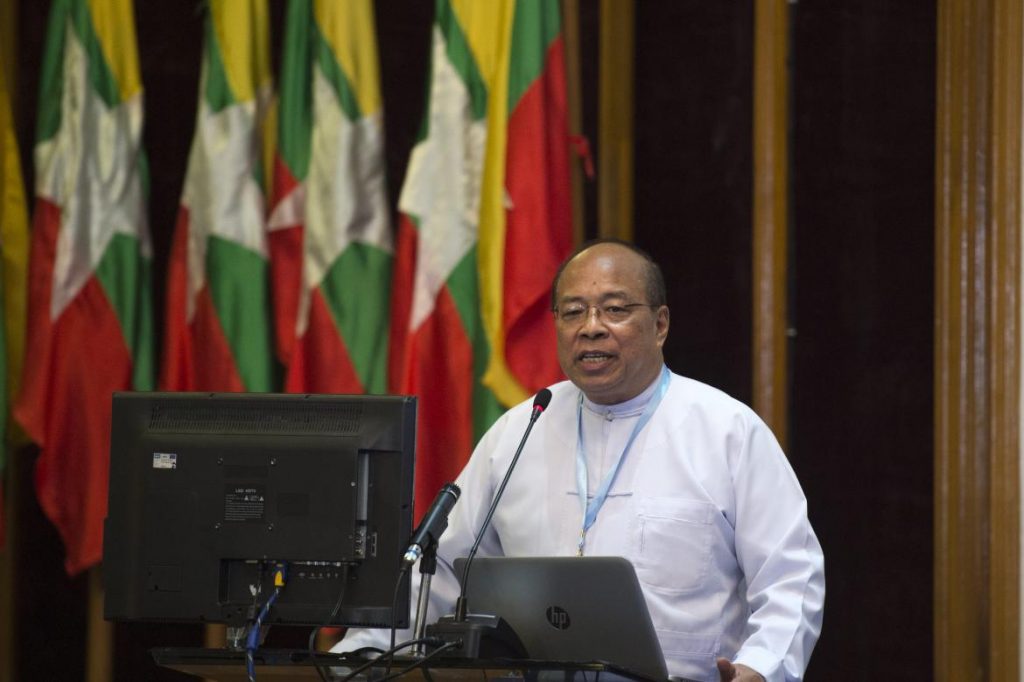National Security Adviser U Thaung Tun says the government will only allow those who can prove citizenship and residence to return from Bangladesh.
By SU MYAT MON | FRONTIER
YANGON — The fate of more than 120,000 refugees who have fled violence in Rakhine State is in doubt after a senior government official said only those with “valid proof” of citizenship will be allowed to return.
Speaking at a press conference in Nay Pyi Taw this afternoon, National Security Adviser U Thaung Tun also said he was lobbying “some countries” to keep the Rakhine State issue out of the United Nations Security Council, despite widespread international condemnation of Myanmar’s actions.
While Thaung Tun didn’t mention discussing the issue with Russia or China specifically, he did note that they were permanent members of the Security Council and they could block discussion of the issue.
Asked about repatriation of refugees, Thaung Tun said only those with proof they have lived in Rakhine and are a citizen would be accepted back.
Support more independent journalism like this. Sign up to be a Frontier member.
“If they have proof then we can accept them like in previous years,” he said, referring to repatriation programmes undertaken following earlier Tatmadaw campaigns in Rakhine State. “If they don’t have proof then it is not possible.”
He did not explain what sort of proof the refugees would have to show. Many are stateless Muslims who previously held Temporary Registration Cards pending a formal decision on their eligibility for citizenship.
Thaung Tun’s comments come a day after the United Nations said more than 123,000 people, mostly Muslims who identify as Rohingya, have crossed the border into Bangladesh since the Arakan Rohingya Salvation Army launched attacks on 30 police posts and a military camp in northern Rakhine State on August 25.
The same day, the government designated Maungdaw, Buthidaung and Rathedaung townships a military operations area, and ordered the military to send soldiers and helicopters to bring the situation under control, according to government spokesman U Zaw Htay.
Thaung Tun said President U Htin Kyaw was coordinating with Commander-in-Chief Min Aung Hlaing on a daily basis on the government response to the attacks.
He added that the conflict differed significantly from earlier outbreaks of communal violence in Rakhine State because it posed a threat to national sovereignty.
“Obviously the attacks made by the ARSA are aimed at establishing a separate territory from Rakhine for Muslims,” Thaung Tun said.
“We will defend and protect our territory and people,” he said, adding that security forces were trying to “avoid harming innocent civilians”.
Asked about allegations of human rights abuses against the area’s Muslim population, he said the government could not accept allegations without solid proof.
He took aim at what he called a “disinformation campaign” on social media, citing a much-derided tweet from Turkey’s deputy prime minister that called on the international community to “stop turning a blind eye to ethnic cleansing”.
The tweet carried four photos purportedly showing abuses in Rakhine State, but at least three were from other countries, including one of the Rwandan genocide.
“We can’t accept this kind of disinformation,” Thaung Tun said, adding that the government is serious about finding a way forward in Rakhine State.
“We are determined to [ensure] a more prosperous [Rakhine State] and it will be Rakhine for all the communities.”
The press conference was also attended by Zaw Htay and Minister for Social Welfare, Relief and Resettlement U Win Myat Aye.
Win Myat Aye said the government had tried to reach all communities to provide assistance, particularly in the most affected areas of northern Rakhine State.
Mines planted by the ARSA meant the government needed to use helicopters to reach many areas.
“The ministry is trying to reach out to the Muslim community as well to provide assistance,” he said.







